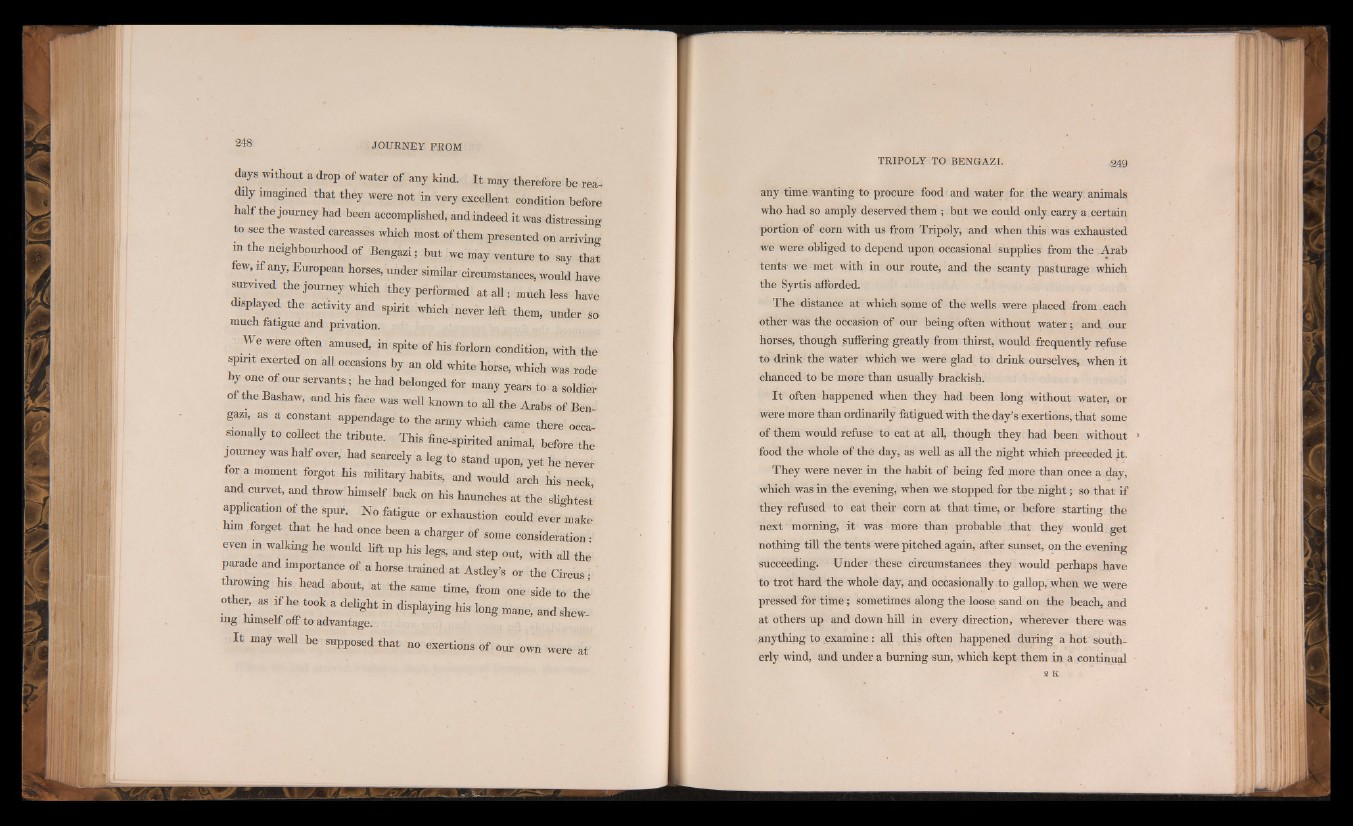
aays without a drop of water of any kind. I t may therefore be readily
imagined that they were not in very excellent condition before
half the journey had been accomplished, and indeed it was distressing
to seethe wasted carcasses which most of them presented on arriving
in the neighbourhood of Bengasi; but we may venture to say that
few, if any, European horses, under similar circumstances, would have
survived the journey which they performed at all; much less have
displayed the activity and spirit which never left them, under so
much fatigue and privation.
We were often amused, in spite of his forlorn condition, with the
spirit exerted on all occasions by an old white horse, which was rode
by one of our servants; he had belonged for many years to a soldier
of the Bashaw, and his face was well known to all the Arabs of Bengasi,
as a constant appendage to the army which came there occasionally
to collect the tribute. This fine-spirited animal, before the
journey was half over, had scarcely a leg to stand upon, yet he never
for a moment forgot his military habits, and would arch his neck
and curvet, and throw himself back on his haunches at the slightest
application of the spur. No fatigue or exhaustion could ever make
him forget that he had once been a charger of some eonsideration •
even in walking he would lift up his legs, and step out, with all the
parade and importance of a horse trained at Astley’s or the Circus •
throwing his head about, at the same time, from one side to the
1 V 38 ; : h; t00k; de%mg himself off to advantageh. t “ his3 S a n d s h e w -
I t may well be supposed that no exertions of our own were at
any time wanting to procure food and water for the weary animals
who had so amply deserved them ; but we could only carry a. certain
portion of corn with us from Tripoly, and when this was exhausted
we were obliged to depend upon occasional supplies from the Arab
tents we met with in our route, and the scanty pasturage which
the Syrtis afforded.
The distance at which some of the wells were placed .from ..each
other was the occasion of our being often without water ; and our
horses, though suffering greatly from thirst, would frequently refuse
to drink the water which we were glad to drink ourselves, when it
chanced to be more than usually brackish.
I t often happened when they had been long without water, or
were more than ordinarily fatigued with the day’s exertions, that some
of them would refuse to eat at all, though they had been without >
food the whole of the day, as well as all the night which preceded it.
They were never in the habit of being fed more than once a day,
which was in the evening, when we stopped for the night ; so that if
they refused to eat their corn at that time, or before starting the
next morning, it was more than probable that they would , get
nothing till the tents were pitched again, after sunset, on the evening
succeeding. Under these circumstances they would perhaps have
to trot hard the whole day, and occasionally to gallop, when we were
pressed for time ; sometimes along the loose sand on the beach, and
at others up and down hill in every direction, wherever there was
anything to examine : all this often happened during a hot southerly
wind, and under a burning sun, which kept them in a continual